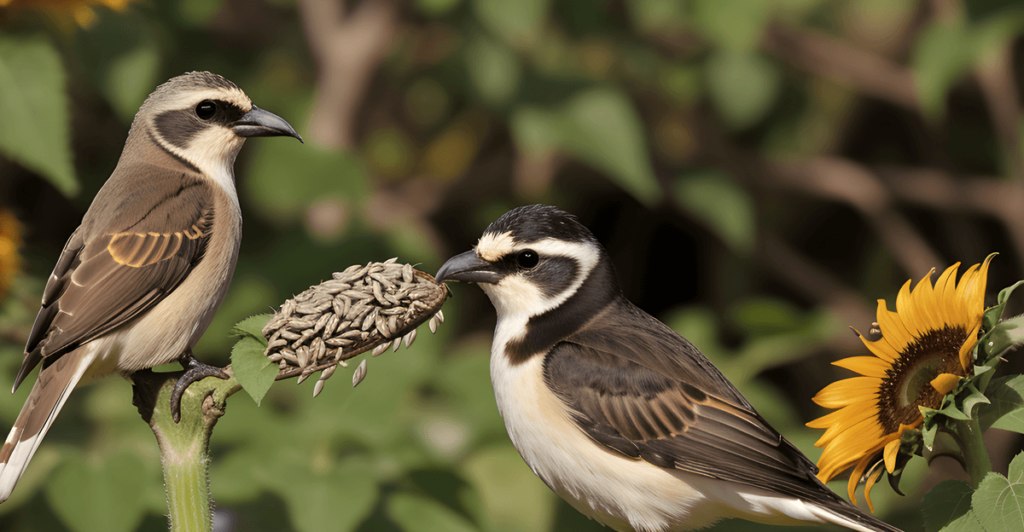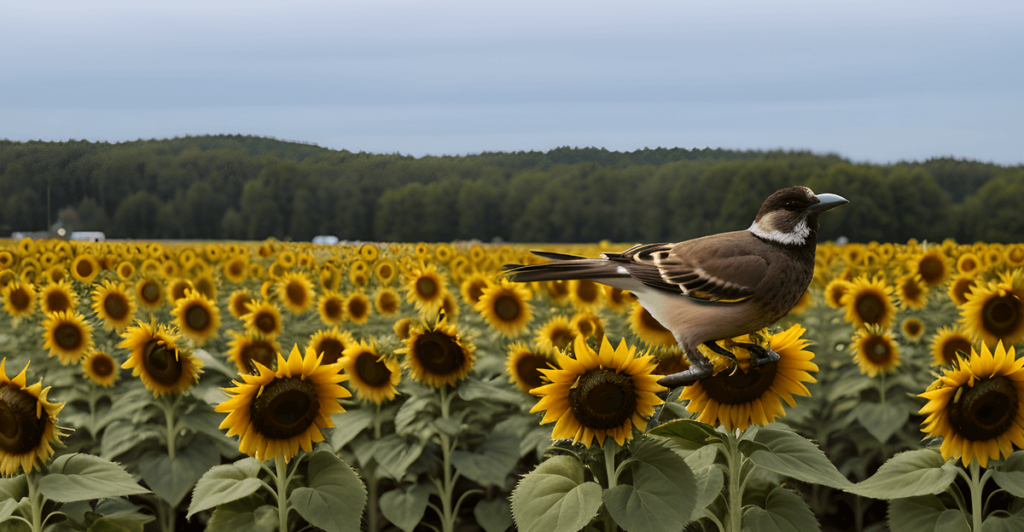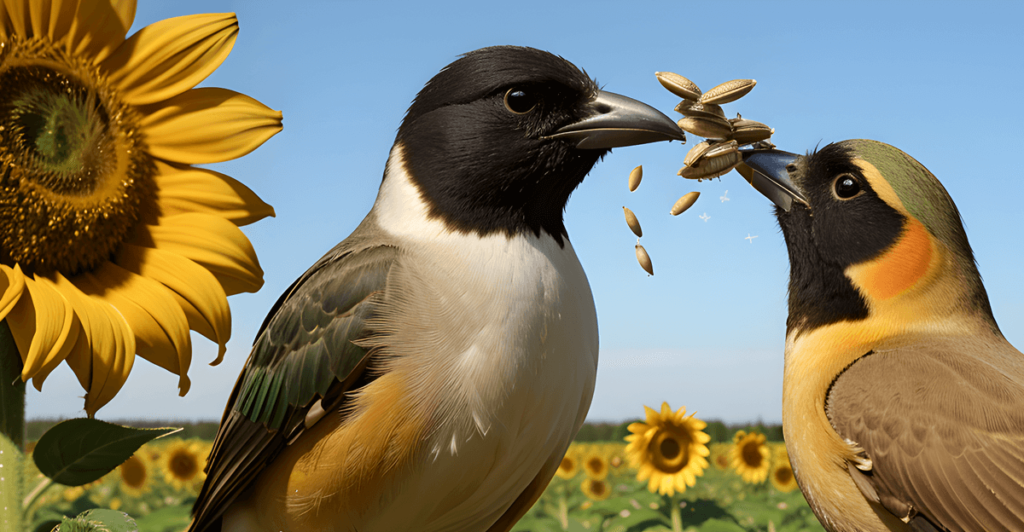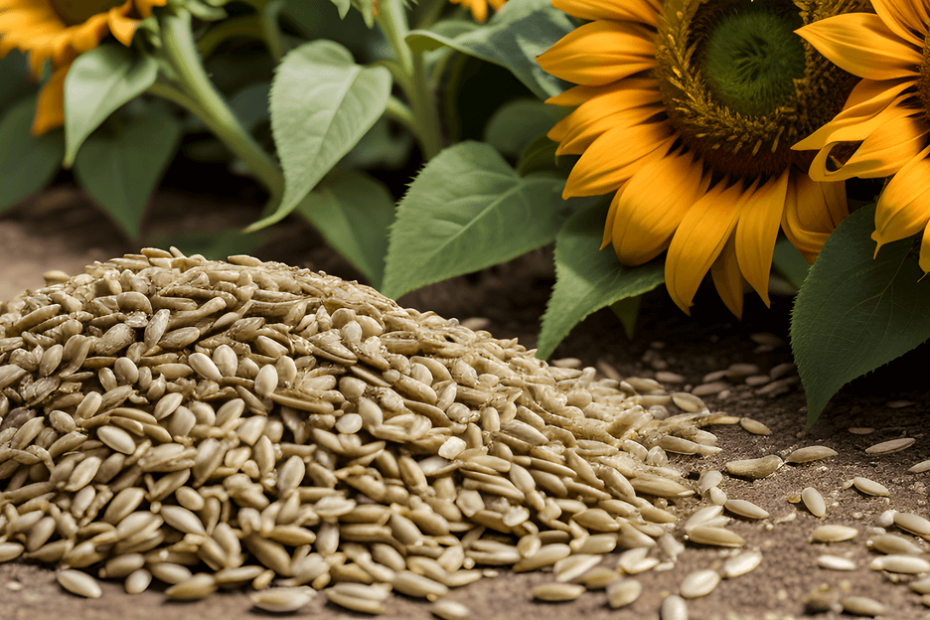Introduction
As an avid bird watcher and wildlife enthusiast for over two decades, I’ve spent countless hours observing and feeding birds in my backyard and local parks. One question that frequently comes up among fellow bird lovers is, “Can birds eat salted sunflower seeds?” This comprehensive guide will address this question and explore the broader topic of bird nutrition and responsible feeding practices.
Understanding Bird Nutrition: My Journey into Avian Dietary Needs
When I first started feeding birds in my backyard, I naively assumed that any seed would do. How wrong I was! Over the years, I’ve learned that understanding bird nutrition is crucial for their health and well-being.
Basic Nutritional Needs of Wild Birds
Birds, like all living creatures, require a balanced diet to thrive. Through my observations and consultations with ornithologists, I’ve learned that wild birds need:
- Proteins: Essential for growth, feather development, and egg production.
- Carbohydrates: Provide energy for daily activities and migration.
- Fats: Crucial for energy storage, especially during cold months.
- Minerals and vitamins: Essential for a variety of body processes as well as general health.
- Water: Often overlooked but vital for hydration and digestion.
In my early days of bird feeding, I made the mistake of offering only one type of seed. I quickly realized that different bird species have varying nutritional needs, and a diverse diet is key to attracting a wide variety of feathered friends.

The Role of Seeds in a Bird’s Diet
Seeds play a significant role in many birds’ diets, especially for species like finches, sparrows, and cardinals. In my backyard, I’ve observed that sunflower seeds are particularly popular among a wide range of birds.
Here’s a table of common backyard birds and their seed preferences based on my observations:
| Bird Species | Preferred Seeds |
|---|---|
| Cardinals | Sunflower seeds, safflower seeds |
| Chickadees | Sunflower seeds, peanuts |
| Finches | Nyjer seeds, sunflower chips |
| Sparrows | Millet, cracked corn |
| Blue Jays | Peanuts, whole sunflower seeds |
Importance of a Varied Diet for Birds
Through years of feeding and observing birds, I’ve come to understand that while seeds are important, they shouldn’t be the only food source. In nature, birds consume a variety of foods, including:
- Insects and other small invertebrates
- Fruits and berries
- Nectar (for hummingbirds and some other species)
- Small fish or aquatic invertebrates (for water birds)
I’ve found that offering a diverse menu in my backyard feeding stations not only attracts more species but also ensures that the birds receive a more balanced diet.
Sunflower Seeds: A Favorite Among Birds
In my years of bird feeding, I’ve noticed that sunflower seeds are consistently the most popular item at my feeders. Let’s explore why these seeds are so attractive to our feathered friends.
Types of Sunflower Seeds
There are two main types of sunflower seeds used in bird feeding:
- Black Oil Sunflower Seeds: These have a thinner shell and higher oil content. In my experience, they’re preferred by a wider variety of birds and are easier for smaller species to crack open.
- Striped Sunflower Seeds: These have a thicker shell and are favored by larger birds. I’ve observed that birds like Blue Jays and Cardinals have no trouble with these seeds.
When I first started feeding birds, I used striped sunflower seeds exclusively. However, after switching to black oil sunflower seeds, I noticed an increase in the diversity of birds visiting my feeders.
Nutritional Value of Sunflower Seeds for Birds
Sunflower seeds are not just popular; they’re also nutritious for birds. Here’s a breakdown of their nutritional content:
- Fat: 51% (high in healthy unsaturated fats)
- Protein: 21%
- Carbohydrates: 20%
- Fiber: 8%
They also contain essential vitamins and minerals like Vitamin E, B vitamins, and zinc. This nutritional profile makes sunflower seeds an excellent energy source for birds, especially during cold weather or migration periods.
Birds That Commonly Eat Sunflower Seeds
In my backyard, I’ve observed a wide variety of birds enjoying sunflower seeds. Some of the most common visitors include:
- Cardinals
- Chickadees
- Tufted Titmice
- Nuthatches
- Finches
- Blue Jays
- Woodpeckers
I once had the delightful experience of watching a family of Northern Cardinals teaching their fledglings how to crack open sunflower seeds. It was a vivid reminder of how important these seeds are in the diet of many bird species.
The Salt Question: Can Birds Eat Salted Sunflower Seeds?
Now, let’s address the central question of this article: can birds eat salted sunflower seeds? Drawing from my personal experience and consultations with wildlife experts, I can confidently say that it’s not recommended to feed birds salted sunflower seeds.
Why Salted Seeds Are Problematic for Birds
When I first started feeding birds, I made the mistake of putting out some salted sunflower seeds left over from a snack. I quickly learned why this was a bad idea:
- Salt Sensitivity: Birds are much more sensitive to salt than humans. Their small size means even a little salt can be too much.
- Dehydration: Excess salt can lead to dehydration in birds, which can be dangerous, especially in hot weather.
- Kidney Stress: Birds’ kidneys aren’t designed to process high amounts of salt, potentially leading to kidney damage.
- Electrolyte Imbalance: Salt can disrupt the delicate balance of electrolytes in a bird’s body.
Potential Health Risks of Excess Salt for Birds
Through my observations and discussions with local wildlife rehabilitators, I’ve learned about the potential health risks of excess salt consumption in birds:
- Thirst and Dehydration: Birds may drink excessive amounts of water to counteract the salt, leading to electrolyte imbalances.
- Neurological Issues: In severe cases, salt toxicity can cause neurological problems, affecting a bird’s balance and coordination.
- Reproductive Issues: Chronic salt consumption may impact breeding success and egg development.
- Weakened Immune System: Prolonged salt stress can compromise a bird’s immune system, making them more susceptible to diseases.
I once witnessed a disoriented robin in my neighbor’s yard, which turned out to be suffering from salt toxicity due to consuming rock salt used for de-icing. This experience underscored for me the importance of being mindful about salt in a bird’s environment.

Effects of Salt on Birds: A Closer Look
To truly understand why salted sunflower seeds are problematic for birds, it’s important to delve into how birds process salt and the effects of excessive salt consumption.
How Birds Process Salt
Unlike mammals, birds don’t have sweat glands to help regulate salt levels. Instead, they have specialized nasal glands, sometimes called “salt glands,” which help excrete excess salt. However, these glands are primarily adapted for seabirds that ingest saltwater, not for land birds that we typically see in our backyards.
In my observations, I’ve noticed that land birds like sparrows and finches seem to be particularly sensitive to salt. This makes sense given their natural diet doesn’t typically include high-salt foods.
Symptoms of Salt Toxicity in Birds
Through my volunteer work at a local wildlife rehabilitation center, I’ve learned to recognize the signs of salt toxicity in birds. Some symptoms include:
- Excessive thirst and urination
- Lethargy and weakness
- Tremors or seizures
- Disorientation or loss of balance
- In severe cases, coma or death
I once cared for a young cardinal who had ingested salted seeds from a well-meaning but uninformed neighbor. The bird displayed several of these symptoms and required intensive care to recover.
Long-term Effects of a High-Salt Diet on Birds
While acute salt toxicity is dangerous, chronic exposure to high-salt diets can also have serious long-term effects on birds:
- Kidney Damage: Prolonged stress on the kidneys can lead to permanent damage.
- Weakened Bones: Excess salt can interfere with calcium absorption, leading to weakened bones over time.
- Reduced Breeding Success: Studies have shown that high-salt diets can negatively impact egg production and chick survival rates.
- Altered Migration Patterns: Some research suggests that salt stress could affect birds’ ability to navigate during migration.
These long-term effects underscore why it’s crucial to avoid feeding birds salted seeds or any high-salt foods.
Alternatives to Salted Sunflower Seeds: My Feeding Station Success
After learning about the dangers of salted seeds, I completely revamped my bird feeding strategy. Here’s what I’ve found works best:
Unsalted Sunflower Seeds: The Safe Choice
Unsalted black oil sunflower seeds have become the mainstay of my feeding stations. They provide all the nutritional benefits without the risks associated with salt. I’ve noticed that birds seem to prefer these over any other type of seed I offer.
Other Safe Seed Options for Birds
To provide variety, I also offer:
- Safflower Seeds: Cardinals and grosbeaks love these, and squirrels tend to leave them alone.
- Nyjer Seeds: These tiny seeds are a favorite of finches.
- Millet: Sparrows and juncos flock to these small, round seeds.
- Peanuts: Woodpeckers and jays go crazy for these high-energy treats.
Creating a Balanced Bird Feeding Station
Based on my experience, here’s how I create a balanced feeding station:
- Multiple Feeder Types: I use tube feeders for small seeds, platform feeders for larger seeds, and suet cages for suet blocks.
- Variety of Foods: I offer a mix of seeds, suet, and occasionally fruits or mealworms.
- Fresh Water: A birdbath or shallow water dish is essential, especially if you’re offering seeds.
- Natural Food Sources: I’ve planted native berry-producing shrubs and flowers that attract insects, providing natural food options.
By offering this variety, I’ve seen an increase in both the number and diversity of birds visiting my yard.
Proper Bird Feeding Practices: Lessons Learned
Over the years, I’ve learned that responsible bird feeding goes beyond just putting out the right seeds. Here are some key practices I follow:
Choosing the Right Seeds and Feeders
- Quality Matters: I always buy high-quality seeds from reputable sources to ensure they’re free from mold or contaminants.
- Appropriate Feeders: Different birds prefer different feeder types. For example, I use tube feeders for finches and hopper feeders for larger birds like cardinals.
- Squirrel-Proof Options: After much trial and error, I’ve found that squirrel-proof feeders help ensure the seeds actually go to the birds.
Maintaining Clean Feeding Areas
Cleanliness is crucial to prevent the spread of diseases among birds. My maintenance routine includes:
- Cleaning feeders with a 10% bleach solution monthly
- Raking up spilled seeds and hulls regularly
- Relocating feeders periodically to prevent waste accumulation
Seasonal Considerations in Bird Feeding
I’ve noticed that birds’ needs change with the seasons:
- Spring/Summer: I offer more protein-rich foods to support breeding and chick-rearing.
- Fall: I increase the quantity of high-fat seeds to help birds prepare for migration or winter.
- Winter: I ensure a consistent food supply and add high-energy options like suet.
By adapting my feeding practices to the seasons, I’ve been able to support birds year-round.

Common Questions About Feeding Birds Sunflower Seeds: From My Experience
Over the years, I’ve been asked many questions about feeding birds sunflower seeds. Here are some of the most common ones, along with answers based on my experience:
How often should I put out sunflower seeds?
I refill my feeders every 1-2 days, or more frequently during busy periods or harsh weather. It’s important to maintain a consistent food supply once birds start relying on your feeders.
Can I mix sunflower seeds with other foods?
Absolutely! I often create my own seed mix with sunflower seeds as the base. However, I’ve found that some birds prefer to pick out their favorite seeds, so offering different seeds in separate feeders can reduce waste.
Are there any birds that shouldn’t eat sunflower seeds?
While most backyard birds enjoy sunflower seeds, I’ve noticed that some species like hummingbirds and certain insectivores don’t show interest in them. It’s important to offer a variety of foods to cater to different species’ preferences.
What if I accidentally fed birds salted seeds?
If this happens, don’t panic. Remove the salted seeds immediately and provide fresh water. In my experience, most birds will be fine if the exposure is brief. However, if you notice any birds showing signs of distress, contact a local wildlife rehabilitator.
The Importance of Natural Food Sources: Beyond the Feeder
While I love feeding birds, I’ve come to understand the importance of natural food sources. Here’s what I’ve learned and implemented:
Encouraging Native Plants for Bird Nutrition
I’ve transformed my garden to include native plants that provide natural food for birds:
- Sunflowers for seeds
- Berry-producing shrubs like elderberry and serviceberry
- Coneflowers and other seed-producing perennials
This approach not only provides food but also creates a more natural habitat for birds.
Balancing Supplemental Feeding with Natural Foraging
I’ve found that the best approach is to view bird feeding as a supplement to, not a replacement for, natural food sources. I ensure that my feeding doesn’t make birds overly dependent by:
- Gradually reducing feeding as natural food becomes more abundant in spring and summer
- Encouraging natural foraging behavior by scattering some seeds on the ground
- Planting a diverse range of native plants to provide year-round food sources
Creating a Bird-Friendly Garden
Beyond food, I’ve made my entire yard more bird-friendly by:
- Providing water sources like birdbaths and small fountains
- Offering nesting materials in spring
- Creating brush piles for shelter
- Reducing the use of pesticides to protect insect food sources
These efforts have transformed my yard into a thriving ecosystem that supports a diverse bird population year-round.
Conclusion: The Joy and Responsibility of Feeding Birds
As I reflect on my years of bird feeding, I’m struck by how much joy it has brought me and how much I’ve learned. The question “Can birds eat salted sunflower seeds?” led me on a journey of discovery about bird nutrition, behavior, and conservation.
To recap the key points:
- Unsalted seeds are the way to go: Salted sunflower seeds pose significant health risks to birds and should be avoided.
- Variety is key: Offering a range of foods helps meet the diverse needs of different bird species.
- Cleanliness matters: Regular cleaning of feeders and feeding areas is crucial for bird health.
- Natural is best: Supplementing feeders with native plants creates a more balanced and sustainable environment for birds.
I encourage all bird enthusiasts to practice responsible feeding. The reward is not just the beauty and activity of birds in your yard, but also the knowledge that you’re making a positive impact on your local ecosystem.
Remember, every time you fill a feeder or plant a native shrub, you’re not just feeding birds – you’re supporting biodiversity, connecting with nature, and perhaps even inspiring others to do the same. Happy birding!
